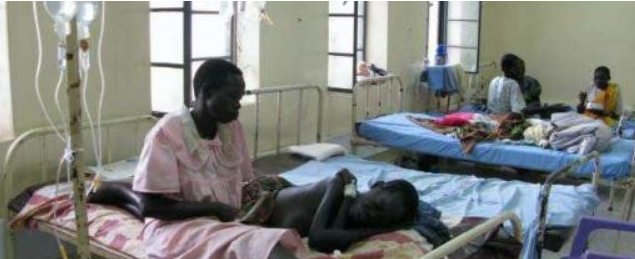The Authorities of the Abyei Special Administrative Area (ASAA) have raised concerns about the deteriorating human health conditions in the region due to a surge in the numbers of returnees, refugees, internally displaced persons (IDPs), and Misseriya tribesmen from Sudan seeking medical services.
While humanitarian organizations and the government are working to address the crisis, the influx has led to a shortage of essential drugs, particularly during the peak malaria and pneumonia season.
Deng Arop, the Abyei Minister of Health, described the current health condition as moderate, acknowledging the efforts made by humanitarian organizations and the government.
“The health situation in Abyei is not terrible but it is not better than 60 percent,” he explained. “The reason is that we have available drugs for Abyei’s host community, but the influx of IDPs, returnees, refugees, and Misseriya people seeking medical treatment in Abyei has led to a poor health condition because the available drugs are not equivalent to the current population.”
Arop expressed gratitude for the support from health partners including MSF, Save the Children, IOM, and GOAL who he said have been instrumental in providing healthcare services to the affected population.
For his part, Bol Koc, the Abyei information minister, also confirmed the substantial support from humanitarian partners and emphasized that the main challenge faced by the region is not insecurity but the overwhelming influx of Misseriya people seeking treatment.
“Now in the MSF hospital, some patients are admitted outside in the compound because the wards are full,” he said.
Meanwhile, Deng Wuor, Abyei, the director of the Relief and Rehabilitation Commission (RRC), highlighted that the influx of refugees, IDPs, and returnees has not only strained healthcare services but also caused food shortages.
“There were returnees whom we did not properly record because they integrated themselves into the community. They are about 128 households, equivalent to 768 individuals and this was the first group that came from Sudan,” he said. “We have registered 1,400 refugees who came from Sudan, while returnees from Sudan number 7,000 individuals.”
In response to the growing crisis, the World Food Programme (WFP) has distributed food to the affected population, with plans for further distribution to address food shortages.
Relatedly, Mathiang Wuor, the Rumamer County Commissioner, reported that his county had recently received malaria drugs from the International Organization for Migration (IOM), which would help alleviate drug shortages.
“The health situation in my county is good because we received a supply of drugs at Agok Hospital from our health partner, IOM,” Mathiang stated. “This has addressed the health situation because before that, there was a shortage of antibiotics and malaria drugs. Even maternity services were not available.”




